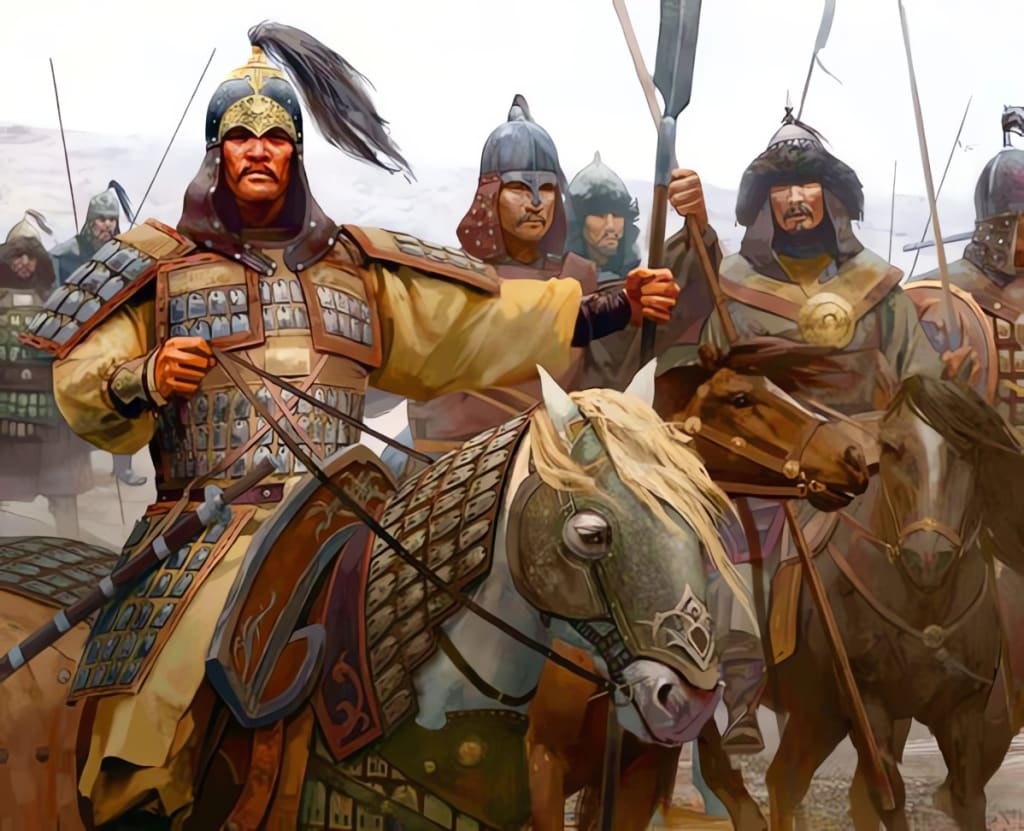The Golden Horde
The Mongol Warriors Who Terrorized Europe

The Kanato of the Golden Horde was a prominent empire during the Middle Ages, characterized by a brilliant culture, well-trained army, and consolidated administrative service system. The empire was home to people of diverse ethnicities, religions, and languages, and their coexistence was a rare example of silent cultural enrichment. The history of the Golden Horde dates back to ancient times when the skilled and visionary military leader, Genesis, aimed to conquer territories and create his own empire. Under the command of Genghis Khan, the Mongols carried out a series of devastating military campaigns, conquering vast tracts of land over many years. Their innovative warfare tactics, such as the use of mobile cavalry and archers, gave them a significant advantage against their enemies. The military might of the Mongols conquered territories in Asia, the Middle East, and Europe, forming the largest empire of contiguous lands in history.
Upon Genghis Khan's death in 1227, his empire was divided into four khanates, which were principalities to be ruled by the families of each of his four sons. However, the westernmost of the four khanates, which encompassed parts of Central Asia, much of Russia, and other parts of Eastern Europe, went to the eldest son, Jorge's old man, who became known as Batucam. Once Batucam consolidated his power over the lands conquered by his grandfather, he gathered his armies and headed west to add more territories under his command. Batucam conquered the Basqueries, a Turkish people west of the Frontiers from Eurasia, in 1235. The following year, he conquered Bulgaria, followed by southern Ukraine in 1237. It took another three years, but in 1240, Batucam conquered the principalities of Rose, after which the Mongols began to take Poland, Hungary, and Austria. However, events in the Mongol homeland soon stopped this campaign of territorial expansion in 1241 when Genghis Khan and the main leader of the Mongol Empire died suddenly.
Batucam was busy in Austria besieging Vienna when he received the news but promptly broke the siege and began marching to Mongolia to contest the succession to the office of supreme leader. He ended up changing his mind about claiming the title of grand can and supported his cousin named Buyuk to take the position. The Golden Horde was established by Batucam with a capital in Sarai in present-day Russia. The Golden Horde established commercial and diplomatic relations with several nations and cultures, and they were known for their wealth, much of it acquired through the military conquests that always involved the sacking of luxurious cities. The Golden Horde also contributed to the spread of Mongol culture, as well as the advancement of trade and science throughout the empire. Most of the empire's population was made up of Hyper Shakes, Bulgarus, Tatars, Kazakhs, and other Slavic peoples and Turks.
Batucam died in 1255 and was succeeded by his son Sartak, who also died abruptly. The weakening of the Mongol rulers paved the way for the princes and nobles of the Light of Kiev to incite rebellions among the Slavic peoples who lived in the territory of the Golden Horde. The Mongol Khanate sent a military force to offer an ultimatum to the rebel leaders of cities like Tunisia and Vonimia. Realizing the gravity of the calamity that is betrayed upon them by the Rush, they obeyed all the demands of the Mongols and tore down the walls of their own cities, knowing that if the Mongols started an attack, the population would be slaughtered to the last living person. The next in line and new leader of the Golden Horde khanate was Batuca's younger brother named Bercken. He maintained his brother's robust style of government and led campaigns in Poland, Lithuania, and Prussia, reinforcing Europe's fear of the Mongols. But perhaps the most important event of Pekkan's reign was his conversion to Islam. The fact that Berk Kahn was Muslim put him in direct conflict with Lake Cam, the leader of the Yucanate, who conquered Iran, Iraq, and part of Turkey and became one of the main powers of the Mongol Empire. The Lagol Can sacked the great Muslim city of Baghdad in 1258 and killed the last Caliph by wrapping him in a rug and then trampling his body repeatedly with the hooves of wild horses.
Bergkan sent his riders from Europe, re-establishing his authority over Poland and Lithuania, forcing the king of Hungary to bow to him. He also demanded submission from King Louis IX of France. In 1260, 1259, and 1260, he nearly destroyed the Teutonic Order, one of the organizations of the German Crusader Knights. Inevitably, the Golden Horde and the Yucanate went to war in 1262
About the Creator
A História
"Hi. My name is Wellington and I'm a passion for general history. Here, I publish articles on different periods and themes in history, from prehistory to the present day.






Comments
There are no comments for this story
Be the first to respond and start the conversation.